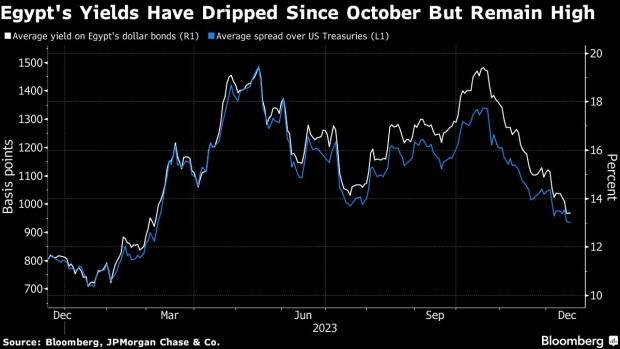Cash-strapped Egypt eyes expanded IMF loan now election is over
An IMF agreement “is likely to be conditional on a currency adjustment, as a prior action,” said Laure de Nervo, the main Egypt analyst at Fitch Ratings Ltd., which in November downgraded the country to B-, deep into junk territory. The war’s impact probably won’t change the need for economic reforms, she said.
- Advertisement -
With Egypt’s elections over, the cash-strapped nation is poised for an increase in financial aid that may ease its dollar shortages and spur much-needed foreign investment, according to people familiar with the deliberations.
The Middle East’s most populous country is nearing a deal with the International Monetary Fund to expand its $3 billion rescue program — little of which has been lent yet — to around $6 billion, said the people, asking not to be identified as the matter is private. That figure could rise even higher, while other multilateral partners may also provide new funding, they said.
It’s not clear if the agreement will take weeks or months to conclude, but it would be a boost for President Abdel-Fattah El-Sisi, whose re-election extends his almost decade-long rule to 2030. The former field marshal is grappling with the country’s worst economic crisis in decades and global investors expect a devaluation — Egypt’s fourth since early 2022 — in the coming months.
Getting funds from foreign partners would also go a long way to ensuring Egypt avoids a default. Its average dollar-bond yields have dropped since mid-October from over 19% to 13.4%, according to Bloomberg indexes, but remain among the highest in the world.
The war between Israel and Hamas has complicated the country’s plight. The conflict has put Egypt center-stage geopolitically as it’s the main gateway for aid to Gaza, which may give more incentive to the US, European Union and others to support El-Sisi’s government.
But the fighting may also deter some tourists, and in the past week major shipping firms have started to avoid the Suez Canal — a key source of foreign-currency revenue for Cairo — because of attacks by Yemen’s Houthi rebels in the Red Sea.
Earlier this month, IMF Managing Director Kristalina Georgieva said the Washington-based lender was “very likely” to augment Egypt’s current loan because of the new burdens it’s facing.
Officials at Egypt’s central bank and finance ministry weren’t available to comment. The IMF referred Bloomberg to a Dec. 7 press briefing by its communications director, Julie Kozack, in which she said additional financing would be critical to the success of Egypt’s program and discussions on the exact amount were ongoing.
“The IMF, EU and others have all seemed pretty clear that the prospect of Egypt accessing financial support has risen as a result of the conflict,” said Simon Williams, HSBC Holdings Plc’s lead economist for Central and Eastern Europe, the Middle East and Africa.
Georgieva also suggested the government’s priority should be lowering inflation — now at 35% — rather than tackling the currency. That signaled a devaluation may not come as soon as some economists had expected.
A revised IMF program will probably “reflect a new assessment” of Egypt’s position and “carefully balance restoring market confidence without minimizing the authorities’ incentives to reform,” said Jean-Michel Saliba, a Middle East economist at Bank of America.
Devaluation Timing
Even if the IMF and Egypt strike a deal soon, Wall Street and other banks see a devaluation as all but inevitable. The pound’s official rate has been steady at 30.9 per dollar for months. But it is roughly 36% weaker, at 50, on the black market. That’s also the same level at which one-year currency forwards trade, indicating investors see a weakening of that level in the time frame.
“Egypt can get away with a devaluation of less than 36% if it secures external funding from the IMF and, perhaps, Gulf countries,” Ziad Daoud, chief emerging-markets economist at Bloomberg Economics, said to Bloomberg TV on Tuesday.
HSBC and Bank of America expect the central bank to weaken the currency in the first quarter of next year. El-Sisi has resisted such a move given it may worsen the cost-of-living crisis for Egyptians, at least in the short term.
Yet with the currency shortages hindering the ability of businesses to import vital goods, Egypt may not be able to hold out much longer. Georgieva said in October that Egypt would “bleed” reserves until it devalues.
An IMF agreement “is likely to be conditional on a currency adjustment, as a prior action,” said Laure de Nervo, the main Egypt analyst at Fitch Ratings Ltd., which in November downgraded the country to B-, deep into junk territory. The war’s impact probably won’t change the need for economic reforms, she said.
- Advertisement -
- Advertisement -
- Advertisement -


